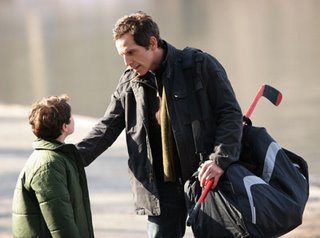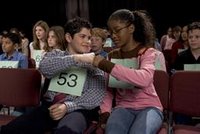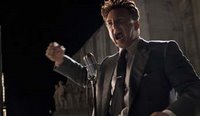 In the movie Night at the Museum, Larry (Ben Stiller) has a lot of crazy ideas, but doesn't have a steady job. His son Nick asks his Dad something to the effect of..."what if you're just an ordinary person" urging him just to settle for any regular job as opposed to pursing his crazy enterprenurial ideas.
In the movie Night at the Museum, Larry (Ben Stiller) has a lot of crazy ideas, but doesn't have a steady job. His son Nick asks his Dad something to the effect of..."what if you're just an ordinary person" urging him just to settle for any regular job as opposed to pursing his crazy enterprenurial ideas.It has recently struck me how the concepts of "ordinary" keeps on arising in different films in 2006.
In Night at the Museum, there is a message in it that some people are almost fated to live extraordinary live's, although there secret may be kept from the world. Almost as if the most extraordinary people are hidden in society.
 This concept is in direct concept to the theme that we see in the Starbucks/Mark Cuban picture Akeelah and the Bee which came out earlier this year. In this film Dr. Larabee (Laurence Fishburne) presents the idea by Marianne Williamson again and again that: "Our deepest fear is not that we are inadequate. Our deepest fear is that we are powerful beyond measure. We ask ourselves, Who am I to be brilliant, gorgeous, talented, fabulous? Actually, who are you not to be? We were born to make manifest the glory of God that is within us. And as we let our own light shine, we unconsciously give other people permission to do the same."
This concept is in direct concept to the theme that we see in the Starbucks/Mark Cuban picture Akeelah and the Bee which came out earlier this year. In this film Dr. Larabee (Laurence Fishburne) presents the idea by Marianne Williamson again and again that: "Our deepest fear is not that we are inadequate. Our deepest fear is that we are powerful beyond measure. We ask ourselves, Who am I to be brilliant, gorgeous, talented, fabulous? Actually, who are you not to be? We were born to make manifest the glory of God that is within us. And as we let our own light shine, we unconsciously give other people permission to do the same."The Akeelah-concept of ordinary is that we are each so extraordinary, that when we break free of ourselves we have the power to let other's realize they too can be extraordinary.
 The movie All The King's Men also is an interesting portrayl of the "ordinary character" through Willie Stark (Sean Penn). In thi re-done movie, Sean Penn is a fairly ordinary person, who becomes an icon for the ordinary. And instead of really becoming an extraordinary person alone, he really becomes a voice of populist, and his own eccentricities and drive allow him to be the "head of the ordinaries."
The movie All The King's Men also is an interesting portrayl of the "ordinary character" through Willie Stark (Sean Penn). In thi re-done movie, Sean Penn is a fairly ordinary person, who becomes an icon for the ordinary. And instead of really becoming an extraordinary person alone, he really becomes a voice of populist, and his own eccentricities and drive allow him to be the "head of the ordinaries."Is this not in someways the point of Clint Eastwood's film Flags of Our Fathers as some select individuals become heroes, although compared to many of the other war heroes, these most famous ones are the most ordinary of them all?
Or what about Effie White (Jennifer Hudson) and Deena Jones (Beyonce Knowles) in Dreamgirls, isn't there great conflict between who is ordinary and who is extraordinary.
In Paul Greengrass' United 93 there is not individual hero, but rather there is a collective hero of human good uniting, NOT individuals who in the end are counted extraordinary.
In any respect the theme of what it means to be ordinary/extraordinary certainly appeared in the cinema's this past year, and at the same time the films certainly do not offer a unified thesis, but rather represent a struggle that we have between a dream that we can all change the world, and a frusteration of not knowing how or having the opportunity to do it.
Related Tags: ordinary, extraordinary, film theme, Dream Girls, Night at the Museum, Ben Stiller, Jennifer Hudson, Beyonce Knowles, Akeelah and the Bee, Starbucks, Marianne Robinson, Laurence Fishburne, United 93, Paul Greengrass, Flags of Our Fathers, Clint Eastwood, All the Kings Men, Sean Penn, Opportunity, 2006, Film

4 comments:
We took the kids to see Night at the Museum. I was prepared to be bored but it was actually a very nice movie.
That line from the kid in the NATM really resonated with me. It's a struggle I've seen in my family for a long time. Hadn't thought about it having been a theme in Hollywood, though, so thanks for pointing that out.
I didn't think I'd care for this "Night at the Museum" film, but I found it enjoyable. Still, "The Fountain" is my favorite of '06.
What a great analysis!
Post a Comment